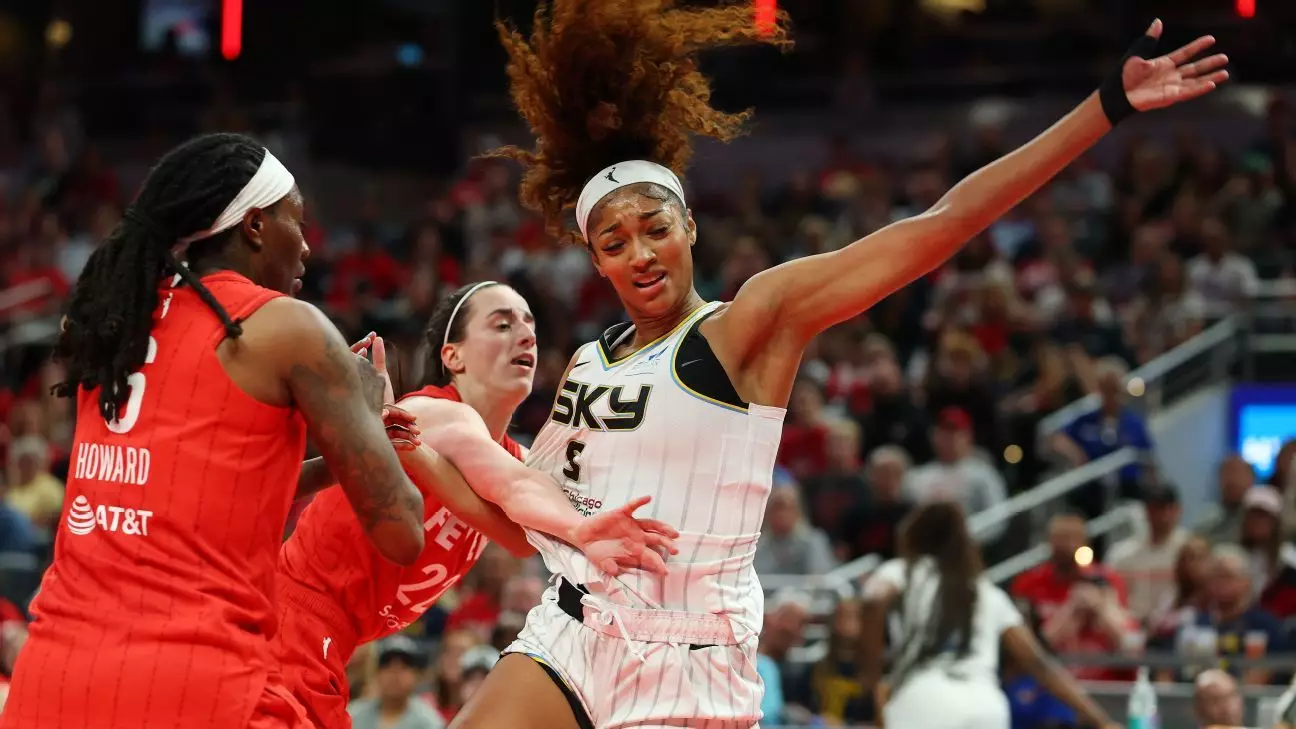In the heated atmosphere of professional sports, where passion often overshadows reason, incidents of fan behavior can spiral into something far more destructive. Recently, during a match between the Chicago Sky and the Indiana Fever, a troubling episode unfolded, directed at one of the sport’s rising stars, Angel Reese. For a league that has prided itself on promoting inclusivity and diversity, this incident poses a significant challenge to the narrative of unity that the WNBA strives for.
As fans assembled at Gainbridge Fieldhouse, their cheers quickly morphed into a chorus of boos directed at Reese, a moment draped in unfortunate irony given the league’s commitment to combatting discrimination. The WNBA’s prompt response acknowledged the severity of the situation: allegations of “hateful fan comments” directed at Reese were alarming, suggesting that the negativity surrounding sportsmanship could no longer be brushed aside as mere crowd behavior. This incident starkly illustrates that while the game undoubtedly brings people together, it also serves as a battleground where toxic elements fester.
A League’s Responsibility to Foster Respect
The WNBA, through its recent “No Space for Hate” initiative, has taken a critical public stance against hate and discrimination. Commissioner Cathy Engelbert’s assurances that the league views basketball as a unifying force emphasize a responsibility not only to its players but also to its fans. However, the very essence of sportsmanship is challenged when the crowd’s reactions betray the respect the league seeks to cultivate.
Fans are not just passive spectators; they have power, and with that power comes responsibility. When individuals turn to hatred rather than the support and camaraderie that sports can inspire, it tarnishes the experience for everyone involved. The league’s commitment to investigating the incident should not be a mere formality but rather a vigorous endeavor aimed at safeguarding the integrity of the sport. This is not just about addressing one incident; it’s about setting a precedent that fan conduct is scrutinized and that foul play should not extend beyond the court.
An Unfortunate Incident of Misplaced Allegiance
The clash between Reese and Caitlin Clark, which ignited the uproar, was largely a basketball play—one that inadvertently tapped into deeper societal issues. While both athletes attempted to downplay the confrontation, asserting it was nothing but a typical game event, the undercurrents of hostility have sparked a more profound dialogue about gender, race, and acceptance within sports. This situation exposes how swiftly a moment of athletic contention can give rise to broader themes of bias and discrimination.
It is disheartening that athletes, especially women of color, often find themselves at the intersection of sportsmanship and cultural prejudice. This incident amplifies the need for a conscious effort in demanding accountability from fans and ensuring that derogatory comments are not tolerated in any arena, be it literal or metaphorical. The backlash Reese faced is emblematic of a cultural issue that transcends the boundaries of the game; it reflects the pervasive nature of racism and misogyny in sports, which cannot and must not be ignored.
Constructive Engagement vs. Toxicity
Navigating the complexities of fan behavior in sports calls for a conscious societal shift towards constructive engagement rather than allowing toxic elements to thrive. The WNBA must utilize this moment as a clarion call, urging supporters to move beyond hatred and instead foster an environment filled with encouragement and respect. The growth of basketball as a unifying force hinges on the collective ability to transcend personal biases and nurture a culture that celebrates rather than vilifies.
Basketball brings together diverse individuals, crafting a vibrant tapestry where stories of struggle and triumph intermingle. It has the potential to forge connections that shatter stereotypes and build bridges across divides. However, this is contingent upon a fundamental understanding that every cheer must stem from a place of respect. The outcry from players’ associations, fans, and the league illustrates a collective desire for balance, grassroot change, and cultural evolution.
The path forward is clear: confront hate with unity, challenge discrimination with inclusivity, and transform passionate engagement into respectful fandom. Only then can the WNBA truly become the beacon it aspires to be—a league where every player, regardless of their background, can feel respected and safe both on and off the court.


Leave a Reply